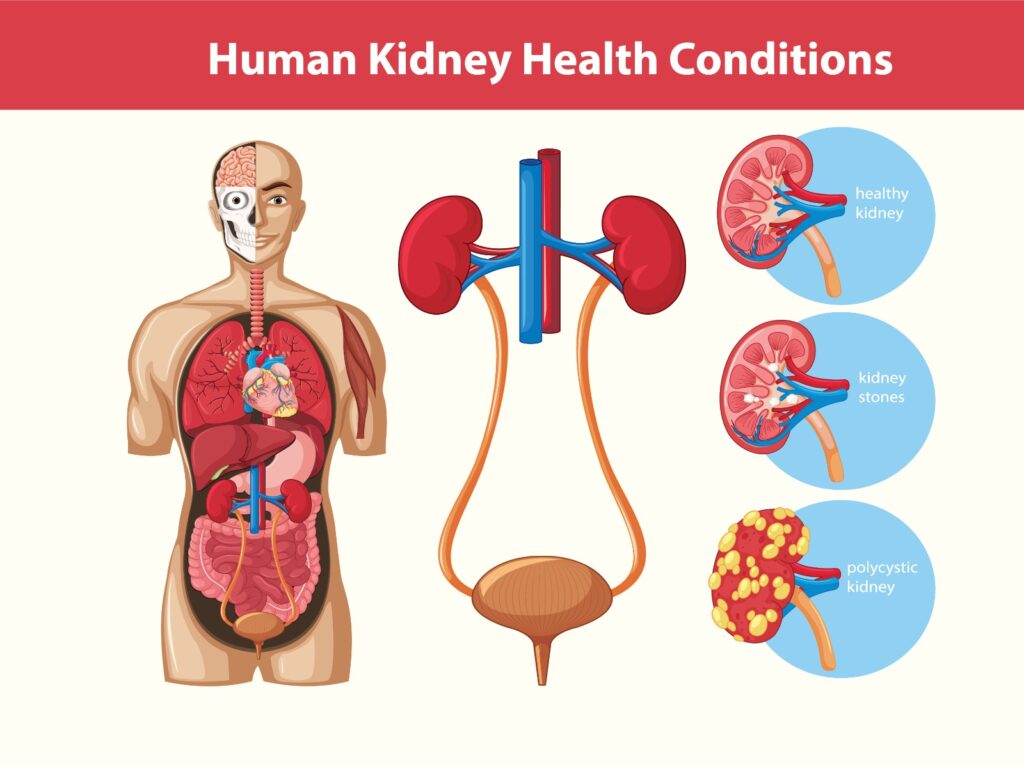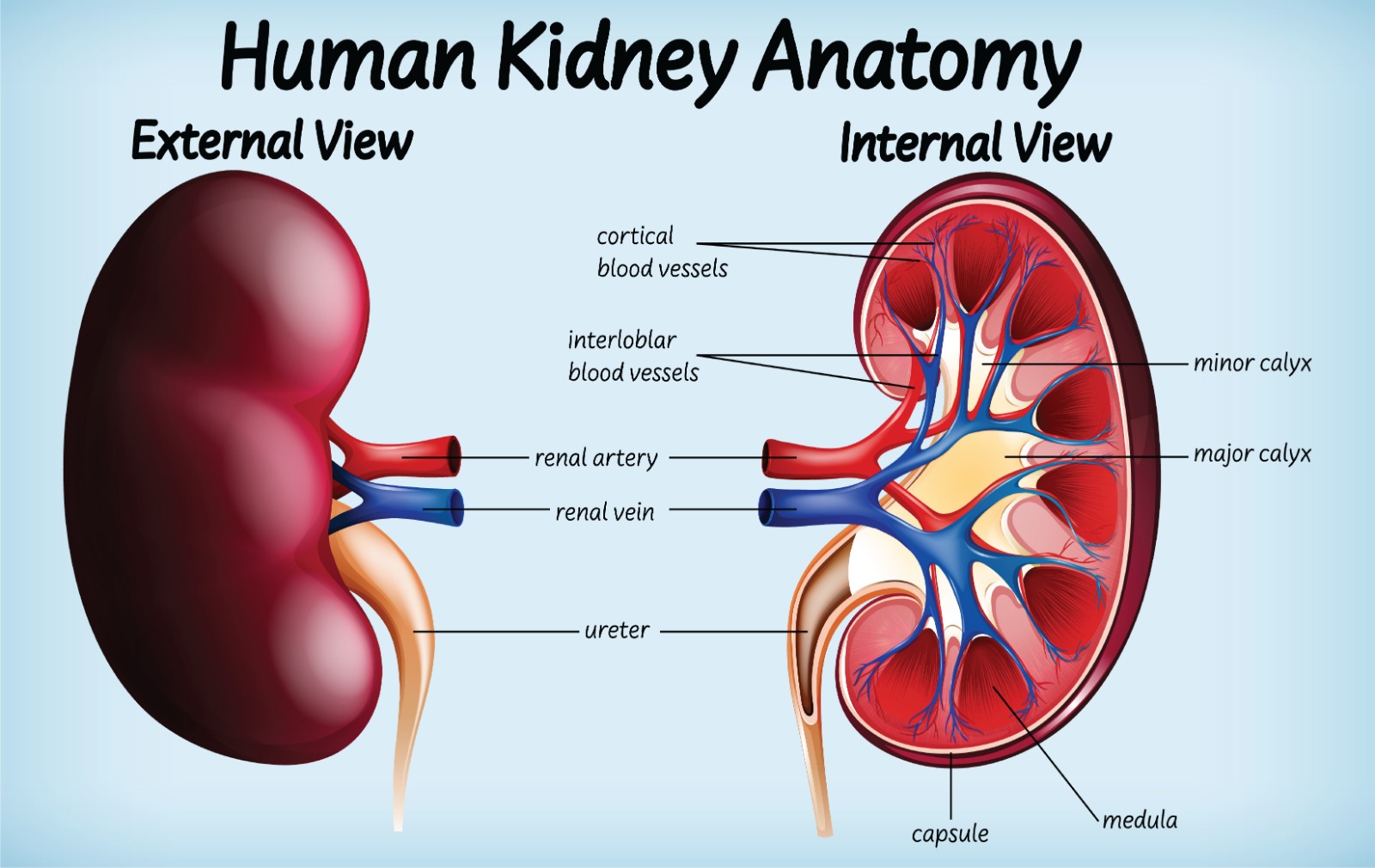7 Ways to Keep Your Kidneys Healthy
Kidneys are some of the most important organs in our body, responsible for filtering waste and excess fluid from our blood. They also perform a wide range of bodily functions. They regulate blood pressure, Secrete erythropoietin-which controls the production of red blood cells, maintaining PH and bone health. Unfortunately, many people neglect their kidney health, leading to various kidney diseases, and may end in chronic kidney disease (CKD). In this blog post, we will discuss the importance of kidney health and some simple steps you can take to make it a priority.
Stay hydrated:
One of the easiest and most effective ways to maintain kidney health is to drink enough water. Staying hydrated helps the kidneys flush out waste and toxins from the body. A general rule of thumb is to drink at least eight glasses of water per day. However, the amount of water you need to drink may vary based on your body size, activity level, and climate. You can also consume other fluids like herbal tea, coconut water, and fruit juices to keep yourself hydrated.
Individuals with chronic kidney disease (CKD) who are in the later stages should reduce their fluid consumption since, as kidney function declines, the kidneys become unable to filter excess fluid, which can result in dangerous consequences.
Eat a healthy diet:
A healthy diet is essential for kidney health. It’s essential to consume a balanced diet rich in fruits, vegetables, whole grains, and lean protein sources like chicken, fish, and legumes. Avoid foods that are high in sodium, refined sugar, and unhealthy fats, as they can increase blood pressure and damage kidney function. If you have any existing health conditions, consult a registered dietitian to help you plan a personalized diet that meets your nutritional needs.
Maintain a healthy weight:
Being overweight or obese can put extra strain on the kidneys and increase your risk of developing kidney disease. Therefore, maintaining a healthy weight through a balanced diet and regular physical activity is crucial for kidney health. Aim to exercise for at least 30 minutes per day, five days a week. You can incorporate various activities like brisk walking, cycling, swimming, and strength training.
Quit smoking and limit alcohol consumption:
Smoking can damage blood vessels and decrease blood flow to the kidneys, increasing the risk of kidney disease. Therefore, quitting smoking is crucial for kidney health. Similarly, excessive alcohol consumption can raise blood pressure and damage the kidneys. If you choose to drink alcohol, limit your intake to moderate levels, which means one drink per day for women and up to two drinks per day for men.
Manage existing health conditions:
Certain health conditions, like diabetes and high blood pressure, can damage the kidneys. Follow your health care provider’s recommendations for medication, diet, and lifestyle modifications to keep these conditions under control.
Manage stress:
Stress can negatively impact kidney health. Consider incorporating stress reducing activities into your daily routine, such as mindfulness meditation, deep breathing exercises, or yoga.
Get regular check-ups:
Regular check-ups with a healthcare provider are crucial for monitoring kidney function and detecting any potential issues early on. Your healthcare provider can perform blood and urine tests to check kidney function, blood pressure, and blood sugar levels.

SYMPTOMS OF KIDNEY DISEASE
Changes in urination
One of the earliest signs of kidney disease is frequent urination. You may notice that you urinate more or less frequently than usual, or you may experience pain or burning during urination. You may also notice that your urine is cloudy or has a foul odour.
Swelling
Swelling in the hands, feet, ankles, and face is a common symptom of kidney disease. This swelling is caused by excess fluid that the kidneys are unable to filter out of the body.
Fatigue
Kidney disease can cause fatigue and weakness due to the build up of toxins in the body that the kidneys are unable to filter out. This can make it difficult to perform daily activities.
Shortness of breath
Kidney disease can cause shortness of breath due to the build-up of fluid in the lungs. This can make it difficult to breathe, especially during physical activity or while lying down.
Nausea and vomiting
Kidney disease can cause nausea and vomiting due to the build-up of toxins in the body. This can make it difficult to eat and can lead to weight loss.
Back pain
Kidney disease can cause back pain that is felt in the area around the kidneys, which are located on either side of the spine just below the ribcage.
High blood pressure
Kidney disease can cause high blood pressure due to the build-up of toxins in the body. This can increase the risk of heart disease and stroke.
Metallic taste in the mouth
Kidney disease can cause a metallic taste in the mouth due to the build- up of toxins in the body.
Kidney disease is a serious health condition that can have significant consequences if left untreated. Knowing the symptoms of kidney disease can help detect it early and prevent further damage. If you experience any of these symptoms, talk to your healthcare provider as soon as possible. They can perform tests to determine if you have kidney disease and provide recommendations for managing it. Remember to always consult with your healthcare provider before making any significant changes to your lifestyle or diet.


